|
|
|
Sort Order |
|
|
|
Items / Page
|
|
|
|
|
|
|
| Srl | Item |
| 1 |
ID:
160748
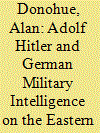

|
|
|
|
|
| Summary/Abstract |
This article primarily examines the work conducted by the intelligence service of the German Army known as Fremde Heere Ost [Foreign Armies East, FHO] and the influence it had on the strategic and operational decision making of Adolf Hitler in the southern sector of the Eastern Front in 1942. Using mainly archival material, FHO estimates of Soviet formations in terms of their deployment areas and strengths during Operations Blau and Edelweiβ are discussed. The FHO organization and Hitler’s own thoughts on military intelligence are also outlined in brief. The article shows that a persistently and excessively optimistic depiction of the supposedly wretched state of the Soviet armed forces by German military intelligence convinced Hitler of the correctness of his decision to resume the offensive in summer 1942 and later to attempt to capture simultaneously his objectives of Stalingrad and the Caucasus oilfields.
|
|
|
|
|
|
|
|
|
|
|
|
|
|
|
|
| 2 |
ID:
131430
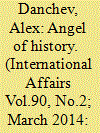

|
|
|
|
|
| Publication |
2014.
|
| Summary/Abstract |
This article explores the way in which art can illuminate war, in particular the Great War. It focuses on Paul Klee's painting, Angelus novus (1920), and the interpretation of that painting by Walter Benjamin, who owned it, in his celebrated theses 'On the concept of history' (1940). Benjamin's interpretation was a kind of parable: he called it the angel of history. Some have taken inspiration from that characterization; others have offered striking alternatives, including Kaiser Wilhelm II and even Adolf Hitler. The article traces the evolution of these identifications; it also considers the continuing artistic response, in historical perspective-notably Anselm Kiefer's The angel of history: poppy and memory (1989). It argues that our conception of the war, and of all wars, is profoundly affected by artistic imagination, and re-imagination.
|
|
|
|
|
|
|
|
|
|
|
|
|
|
|
|
| 3 |
ID:
151891
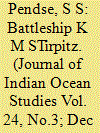

|
|
|
| 4 |
ID:
156488
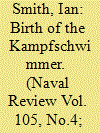

|
|
|
| 5 |
ID:
025390
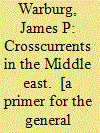

|
|
|
|
|
| Publication |
London, Victor Gollancz Ltd, 1968.
|
| Description |
x, 244p.: mapshbk
|
|
|
|
|
|
|
|
|
|
|
|
Copies: C:1/I:0,R:0,Q:0
Circulation
| Accession# | Call# | Current Location | Status | Policy | Location |
| 001925 | 956/WAR 001925 | Main | On Shelf | General | |
|
|
|
|
| 6 |
ID:
102747
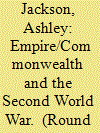

|
|
|
|
|
| Publication |
2011.
|
| Summary/Abstract |
The whole British Empire was involved in the Second World War from its outset. This article challenges the myth of Britain 'alone' against Hitler; one-fifth of the world's population was at war because Britain was. Britain called on vast colonial resources to defend a global empire and global trade. The importance of the African continent has been overlooked, but Africa experienced a large range of military activities by land, sea and air and personnel from all over the Empire served there.
|
|
|
|
|
|
|
|
|
|
|
|
|
|
|
|
| 7 |
ID:
034865
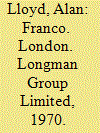

|
|
|
|
|
| Publication |
London, Longman Group Limited, 1970.
|
| Description |
256p.Hbk
|
| Contents |
Includes Index.
|
| Standard Number |
582108047
|
|
|
|
|
|
|
|
|
|
|
|
Copies: C:1/I:0,R:0,Q:0
Circulation
| Accession# | Call# | Current Location | Status | Policy | Location |
| 006074 | 923.146/LIO 006074 | Main | On Shelf | General | |
|
|
|
|
| 8 |
ID:
157412
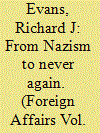

|
|
|
|
|
| Summary/Abstract |
Defeated regimes are not only swiftly removed from power but often immediately erased from memory as well. When Adolf Hitler’s “thousand-year German Reich” came crashing down in 1945 with the Allied victory in World War II, reminders of the 12 years of its actual existence were hastily scrubbed away as Germans scrambled to adjust to life after Nazism. Stone swastikas were chiseled off the façades of buildings, Nazi insignia were taken down from flagpoles, and, in towns and cities across Germany, streets and squares named after Hitler reverted to their previous designations.
|
|
|
|
|
|
|
|
|
|
|
|
|
|
|
|
| 9 |
ID:
128801
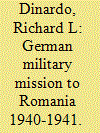

|
|
|
| 10 |
ID:
133211
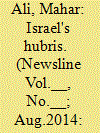

|
|
|
|
|
| Publication |
2014.
|
| Summary/Abstract |
The prime minister of Israel, Benjamin Netanyahu, has a problem with "telegenically dead" victims of his nation's formidable firepower. It is the sort of phrase that Adolf Hitler or Josef Goebbels might have been expected to come up with, had television existed in the 1930s or '40s, and chosen to focus on the Jewish victims of the Nazi killing machine.
|
|
|
|
|
|
|
|
|
|
|
|
|
|
|
|
| 11 |
ID:
045308
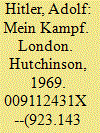

|
|
|
|
|
| Publication |
London, Hutchinson, 1969.
|
| Description |
xlviii, 629p.Pbk
|
| Standard Number |
009112431X
|
|
|
|
|
|
|
|
|
|
|
|
Copies: C:1/I:0,R:0,Q:0
Circulation
| Accession# | Call# | Current Location | Status | Policy | Location |
| 025024 | 923.143/HIT 025024 | Main | On Shelf | General | |
|
|
|
|
| 12 |
ID:
132459
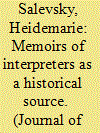

|
|
|
|
|
| Publication |
2014.
|
| Summary/Abstract |
There exist incompatible depictions of the Second World War, and specifically of the year 1941. Numerous documents from the archives now available in Moscow and Washington invite comparison with the memoirs of contemporary witnesses. The present article first describes the situation in German-Soviet relations before 22 June 1941. Then it contrasts the memoirs of the interpreters involved (in the German Embassy in Moscow, in the Soviet Embassy in Berlin, and at the delivery of the memorandum by Ribbentrop to Dekanozov) with newly available archive material and with the official records of the Nuremberg trial. The goal of this comparison is to form an assessment of these memoirs as subjective historical sources and to arrive at a new evaluation of their reliability.
|
|
|
|
|
|
|
|
|
|
|
|
|
|
|
|
| 13 |
ID:
045297
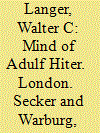

|
|
|
|
|
| Publication |
London, Secker and Warburg, 1972.
|
| Description |
ix, 269p.Hbk
|
| Contents |
Includes bibliography, index.
|
| Standard Number |
436242303
|
|
|
|
|
|
|
|
|
|
|
|
Copies: C:1/I:0,R:0,Q:0
Circulation
| Accession# | Call# | Current Location | Status | Policy | Location |
| 011462 | 923.1/LAN 011462 | Main | On Shelf | General | |
|
|
|
|
| 14 |
ID:
133416


|
|
|
|
|
| Publication |
2014.
|
| Summary/Abstract |
The US intelligence community prepares occasional psychological profiles of foreign political leaders. The origins of these practices lie in frantic and ad hoc attempts to understand the character of Adolf Hitler during the latter stages of the Second World War. The US Office of Strategic Services (OSS) commissioned profiles of Hitler, contracting with a titan of personality theory in Professor Henry A. Murray and practicing psychoanalyst Walter C. Langer. Reconstructing the history of these profiles grounds the contemporary analysis of foreign leaders in the lessons of the pioneers. Useful insights on the challenges of profiling leaders, the relationship of academic theories - and academic personnel - to government, and the role of intelligence in policy abound.
|
|
|
|
|
|
|
|
|
|
|
|
|
|
|
|
| 15 |
ID:
093619
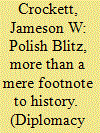

|
|
|
|
|
| Publication |
2009.
|
| Summary/Abstract |
The January 1933 appointment of Adolf Hitler as Chancellor of Germany marked the beginning of the end of the fragile post-war peace throughout Europe. The Polish leadership had good reason to fear his threats of revising the Treaty of Versailles. Realising that Hitler was too dangerous to remain in power, the Polish leadership led by Marshal Jzef Pisudski prepared for a preventive war against Germany. Unfortunately, the appeasement policy among the Western Powers condemned this plan to failure and forced Poland into signing a non-aggression pact with Germany in 1934; thus dooming Poland's existence. To test his premonitions about Hitler, Pisudski created several international "incidents" concerning the Free City of Danzig, designed to test both Germany and whether the Western Powers would fight to uphold the Treaty of Versailles. Pisudski's efforts offer proof that Poland deserves more credit for its determination to deal with a rising tide of Nazi Germany.
|
|
|
|
|
|
|
|
|
|
|
|
|
|
|
|
| 16 |
ID:
132455
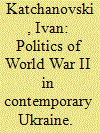

|
|
|
|
|
| Publication |
2014.
|
| Summary/Abstract |
This study examines the role of political factors in attitudes toward World War II in contemporary Ukraine. The research question is which factors determine public views of the principal warring sides and their leaders in Ukraine. The analysis of the 2012 Kyiv International Institute of Sociology survey shows that regional values, political party preferences, ethnicity, language, and age have significant effects on views of the Red Army and the Ukrainian Insurgent Army (UPA) during the war and attitudes toward the wartime activities of Joseph Stalin and Roman Shukhevych. Public perceptions of the German Army and Adolf Hitler in Ukraine do not vary much across regions, political parties, and ethnic, language, age, and sex groups.
|
|
|
|
|
|
|
|
|
|
|
|
|
|
|
|
| 17 |
ID:
023785
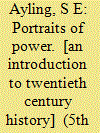

|
|
|
|
|
| Edition |
5th ed.
|
| Publication |
London, George G Harrap and Co. Ltd., 1971.
|
| Description |
432p.Hbk
|
| Standard Number |
0245506608
|
|
|
|
|
|
|
|
|
|
|
|
Copies: C:1/I:0,R:0,Q:0
Circulation
| Accession# | Call# | Current Location | Status | Policy | Location |
| 007885 | 909.82/AYL 007885 | Main | On Shelf | General | |
|
|
|
|
| 18 |
ID:
091278
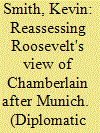

|
|
|
|
|
| Publication |
2009.
|
| Summary/Abstract |
The absence of active Anglo-American cooperation in the late 1930s contributed to an international environment in which Adolf Hitler could maneuver, capitalizing on Neville Chamberlain's zeal for an Anglo-German settlement of outstanding grievances. The reasons for this estrangement included British suspicion of America's power, intentions, and reliability, manifested notably in U.S. rejection of the League of Nations and withdrawal from the 1933 London Economic Conference. British war debt default and failure to coordinate a response in Manchuria angered Americans. Finally, mutual erection of tariff walls and-especially-both peoples' desire to avoid war imposed domestic political constraints.1 Any conventional summary of Anglo-American relations in this era includes reference to the lack of personal affinity between Franklin Roosevelt and Neville Chamberlain. In 1936, Roosevelt had remarked, "We must recognize that he thoroughly dislikes Americans." In December 1937, Chamberlain told his sister, "It is always best and safest to count on nothing from the Americans except words" and advised the cabinet, "the Power that had the greatest strength was the USA, but he would be a rash man who based his calculations on help from that quarter."2 These attitudes were influential. Unpublished private letters from Geoffrey Thompson, an official in the Foreign Office's American Department recently recalled from Spain, to Claude Bowers, U.S. ambassador to Spain, help illustrate the importance of mistrust and the obstacles to a different path in the winter of 1938-1939.
|
|
|
|
|
|
|
|
|
|
|
|
|
|
|
|
| 19 |
ID:
128549
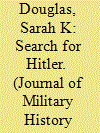

|
|
|
|
|
| Publication |
2014.
|
| Summary/Abstract |
In September 1945, British intelligence officer Hugh Trevor-Roper was asked to investigate the circumstances surrounding the death of Adolf Hitler. Two years later, he published his conclusions in The Last Days of Hitler, still recognized as the standard work. But, despite some delving into the subject in a recent biography of the author by Adam Sisman, it has remained unclear until now how Trevor-Roper managed to so rapidly gather the evidence on which his book is based. The account below, rooted in heretofore unseen or underused archival sources, highlights the crucial but unacknowledged support Trevor-Roper received from Allied intelligence services and from a timeline drafted by intelligence officer Captain Humphrey Searle, later a well-known composer, that combined all of the data assembled into a single record of events of the last days in the Führerbunker.
|
|
|
|
|
|
|
|
|
|
|
|
|
|
|
|
| 20 |
ID:
119761
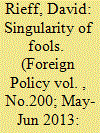

|
|
|
|
|
|
|
|